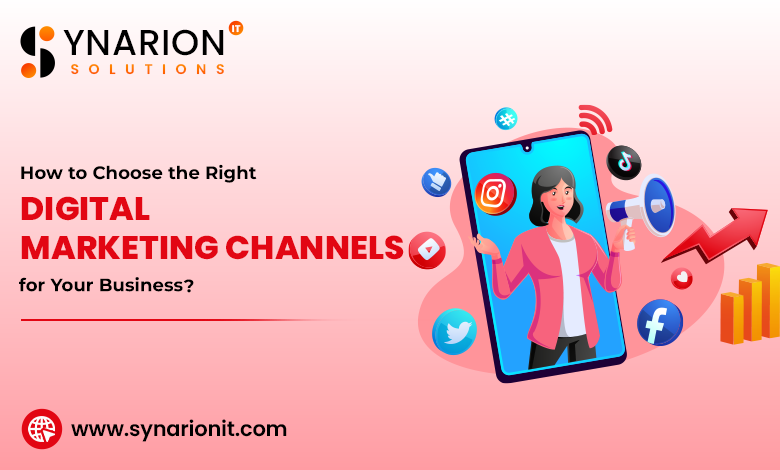Introduction
In today’s fast-paced and digitally connected world, businesses must leverage digital marketing to reach their target audience effectively. With the proliferation of social media, search engines, email platforms, and other digital spaces, choosing the right digital marketing channels can be overwhelming. However, selecting the right channels for your business is crucial for optimizing your marketing efforts and driving growth.
The decision about which digital marketing channels to focus on depends on various factors, such as your target audience, business goals, budget, and resources. By understanding the strengths and weaknesses of each platform and aligning them with your marketing objectives, you can maximize your return on investment (ROI). Here’s how to choose the right digital marketing channels for your business:
Understand Your Business Goals
The first step in choosing the right digital marketing channels is to clearly define your business goals. Are you aiming to increase brand awareness, generate leads, drive website traffic, or boost online sales? Different digital marketing channels serve different purposes, so it’s essential to align your goals with the channels that are best suited to achieving them.
- Brand Awareness: If your goal is to get the word out about your products or services, channels like social media, display ads, and influencer marketing can be great choices.
- Lead Generation: For lead generation, platforms like LinkedIn, Google Ads, and content marketing (through SEO and blogs) are often more effective.
- Sales Conversion: If you’re focused on driving sales, consider utilizing email marketing, retargeting ads, or a strong eCommerce presence.
Know Your Target Audience
Understanding your target audience is crucial in determining which digital marketing channels will work best for your business. Different demographic groups and consumer behaviors are present across various platforms. For instance, younger audiences may be more active on Instagram or TikTok, while older audiences may engage more with Facebook or email marketing.
To get a deeper understanding of where your audience spends their time, use analytics tools to track your website traffic and social media engagement. You can also leverage market research or customer surveys to pinpoint the most effective platforms. If you need expert guidance, you can always turn to a professional digital marketing company for assistance in analyzing audience behavior.
Evaluate Available Digital Marketing Channels
Once you have a clear understanding of your business goals and target audience, the next step is to evaluate the digital marketing channels available to you. Here’s a breakdown of the most popular channels and when they’re most effective:
Search Engine Optimization (SEO)
SEO involves optimizing your website to rank higher in search engine results pages (SERPs). If your target audience actively searches for products or services like yours, SEO can drive long-term, organic traffic to your website. It’s a cost-effective strategy but requires time and ongoing effort to see results.
Pay-Per-Click (PPC) Advertising
Google Ads and Bing Ads are effective ways to reach potential customers through paid search engine ads. PPC allows you to target specific keywords and demographics, delivering immediate results. However, it can be expensive, so it’s essential to have a well-planned strategy.
Social Media Marketing
Social media platforms such as Facebook, Instagram, LinkedIn, and TikTok offer businesses opportunities to engage with customers, promote content, and drive website traffic. The effectiveness of social media marketing depends on how well you tailor your content to each platform and the audience you aim to reach.
Email Marketing
Despite the rise of newer marketing channels, email marketing remains one of the most effective ways to engage customers. It’s particularly useful for lead nurturing, promoting new products, and building customer loyalty. An effective email campaign requires a solid email list, personalized content, and A/B testing to improve open rates and conversions.
Content Marketing
Blogs, eBooks, webinars, and videos fall under content marketing. This approach is ideal for establishing your brand as an authority in your industry while also providing value to your audience. Good content marketing strategies boost SEO rankings, nurture leads, and foster customer loyalty.
Affiliate Marketing
In this model, you partner with affiliates who promote your products in exchange for a commission on sales. This is a performance-based channel that’s particularly beneficial for eCommerce businesses.
Influencer Marketing
Partnering with influencers can help boost your brand’s visibility and credibility, particularly if they have a strong following in your niche. It’s a highly effective way to reach a targeted audience, especially when combined with social media platforms.
Consider Your Budget and Resources
Different digital marketing channels require different levels of investment. Some, like SEO and content marketing, can be more cost-effective over time, but they require significant time and effort to yield results. Others, like PPC advertising or influencer partnerships, may require a larger budget for optimal success.
Assess your business’s current budget and resources. If you have limited resources, it’s better to start with a few well-targeted channels and gradually scale up. Alternatively, if you have a larger budget, you can experiment with a broader mix of digital marketing services.
Test and Optimize
Once you’ve selected your digital marketing channels, don’t forget that success doesn’t happen overnight. Continuously test and optimize your strategies to improve performance. Monitor key metrics such as traffic, engagement, leads, and conversions to assess how well each channel is performing. Regularly tweak your campaigns based on data-driven insights to ensure that you are getting the best possible results.
If you find that your current strategies are not delivering the desired outcomes, consider working with a digital marketing company. Experienced marketers can provide valuable insights and implement advanced techniques to enhance your marketing campaigns.
Conclusion
Choosing the right digital marketing channels is a process that requires careful analysis of your business goals, target audience, and available resources. By focusing on the channels that are most aligned with your objectives, you can maximize the effectiveness of your marketing efforts. Whether you’re aiming for brand awareness, lead generation, or sales conversion, the key is to stay agile and adjust your strategy based on results. By leveraging professional digital marketing services and constantly optimizing your campaigns, your business can achieve sustainable growth in the digital landscape.



